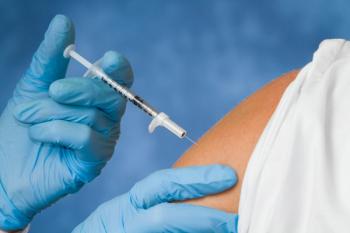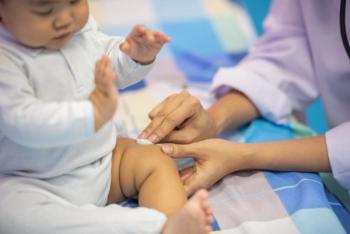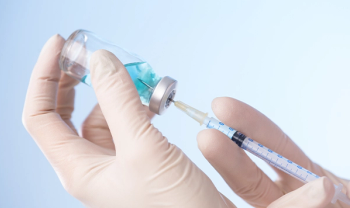
- MHE March 2023
- Volume 33
- Issue 03
RSV Vaccine Development Is On the Comeback Trail
Research stalled for decades after deaths in a 1960s trial. Now Pfizer and other companies are reporting results for a vaccine against respiratory syncytial virus infections.
Respiratory syncytial (pronounced sin-SISH -shul) virus (RSV) is a highly contagious virus that can affect the lower respiratory tract and is a leading cause of pneumonia and other respiratory tract infections. Many people experience symptoms that are similar to a cold, such as cough, fever, and runny nose. But RSV infection can be more serious for infants and older adults. Both age groups have an increased risk of developing severe disease that may warrant hospitalization and can be fatal. Worldwide, approximately 118,000 children die annually due to RSV, and approximately 50% of these deaths occur in infants younger than 6 months.
In the United States, 58,000 to 80,000 children younger than 5 years are hospitalized yearly due to RSV. In adults 65 years and older, RSV is associated with 60,000 to 160,000 hospitalizations per year. Children who are at high risk for severe disease include those born prematurely or infants 6 months of age or younger. Immunocompromised children and adults and individuals with neuromuscular disorders, such as muscular dystrophy, also have an increased risk of developing severe disease. Adults aged 65 years or older and those with heart or lung disease may also be at a higher risk of severe RSV disease.
In children, severe cases of RSV typically result in a hacking cough and bronchiolitis, which may worsen and become pneumonia or, in the worst cases, respiratory failure. In adults, RSV infection can worsen preexisting respiratory conditions, such as asthma and chronic obstructive pulmonary disease, and can lead to complications such as stroke and myocardial infarction.
RSV, influenza and COVID-19 are a trio of respiratory viruses causing what has been dubbed the “tridemic.” Of the three, RSV is the one for which there is no vaccine approved by the FDA.
Currently, ribavirin is the only antiviral approved to treat RSV in the United States. Its use is limited to infants and young children hospitalized for RSV-related lower respiratory tract infections.
Research for an effective RSV vaccine has stalled for decades after it was dealt a serious setback in the 1960s. A vaccine tested in the United States between 1966 and 1968 resulted in more severe illness in vaccinated children than in those who did not receive the vaccine. Two infants who participated in the trial died. The devastating results led researchers to divert their efforts from developing a vaccine to determining what went wrong.
In 2013, Jason S. McLellan, Ph.D., and a team of researchers at the National Institutes of Health (NIH) discovered what would become the basis for RSV vaccines in the pipeline today. They found that the F protein, a molecule found on the surface of the virus that helps it fuse to host cells, comes in two varieties, the prefusion form and the form it takes after infection. The prefusion form occurs before infection and is highly unstable but also produces the stronger immnune response. The post-infection form of the F protein is more stable.
McLellan and colleagues discovered how to stabilize the prefusion F protein and keep it in that state. For vaccine purposes, it is the best of both worlds,a stable version of the prefusion F protein that is more immunogenic. This discovery has paved the way for several companies to develop new RSV vaccine candidates and a long-acting prophylactic monoclonal antibody.
Pfizer takes the lead
Pfizer Inc. became the leader in the race to develop an RSV vaccine for pregnant women after British drug manufacturer GSK plc halted the phase 3 trials evaluating its RSV maternal vaccine candidate in pregnant women in early 2022. The company stopped the studies due to safety concerns.
Pfizer has since proceeded with the development of a bivalent RSV prefusion vaccine candidate, called RSVpreF. Using discoveries made by the NIH research team, RSVpreF delivers synthetic forms of stabilized prefusion F protein. The maternal vaccine is meant to elicit an immune response in those who are pregnant, who should then pass antibodies to their infants.
The phase 3 MATISSE trial evaluated the safety and efficacy of RSVpreF against medically attended lower respiratory tract illness in infants born to women vaccinated between 24 and 36 weeks of pregnancy. Results showed that the RSVpreF was 82% effective against severe illness through the first 90 days of life and 70% effective through the first six months. Encouraged by these positive results, the company has indicated that it plans to submit an application for FDA approval.
If the FDA gives the green light, RSVpreF could be the first maternal vaccine that is FDA approved to protect newborns and young infants against RSV-related illness.
Vaccines to protect older adults
Pfizer may have the market for a potential maternal RSV vaccine to itself, but it has plenty of company when it comes to RSV vaccines for older adults. Pfizer, GSK, Moderna, Inc. and Johnson & Johnson all have RSV vaccine candidates in late-stage development for older adults.
Pfizer’s RSVpreF was also tested in adults 60 years and older in the phase 3 RENOIR trial. Company-reported top-line results show an 85.7% efficacy in preventing more severe disease in older adults. In December 2022, the FDA accepted for priority review an application from Pfizer for using RSVpreF to prevent RSV-related lower respiratory tract disease in adults aged 60 years and older. A decision is expected in May 2023.
GSK also announced promising results for its RSV vaccine candidate for older adults. GSK’s product contains a recombinant subunit RSV prefusion F protein in conjunction with a proprietary adjuvant. Vaccine adjuvants are ingredients added to the vaccine designed to further boost the immune response. In the phase 3 AReSVi-006 trial, the investigational vaccine demonstrated an overall efficacy of 82.6% against RSV-related lower respiratory tract disease in participants 60 years and older and 94.1% efficacy against severe case in adults 70 to 79 years of age. As with Pfizer, the FDA accepted an application for priority review for GSK’s vaccine candidate and is expected to make a decision in May 2023.
Moderna used messenger RNA (mRNA) technology, similar to what it used in its COVID-19 vaccine, to develop an RSV vaccine candidate for adults 60 years and older. The investigational vaccine, called mRNA-1345, stimulates the production of the stabilized version of the prefusion F protein against which the immune system can produce antibodies.
In January 2023, Moderna announced results from the ConquerRSV phase 3 trial, and mRNA-1345 was 83.7% effective against RSV-related lower respiratory tract disease in adults 60 years and older. Based on these strong results, the company plans to submit an application to the FDA sometime during the next few months.
Johnson & Johnson has initiated the EVERGREEN phase 3 trial, evaluating the safety and efficacy of its RSV vaccine candidate in adults 60 years and older. The phase 3 study follows positive results from the CYPRESS phase 2b study, which showed vaccine efficacy of up to 80% in adults 65 years or older. Completion of the EVERGREEN study is expected in late 2024.
Articles in this issue
almost 3 years ago
No Prescription Needed. But Will Insurers Cover OTC Hearing Aids?almost 3 years ago
Nontraditional Players Are Getting Into Healthcare Gamealmost 3 years ago
Digital Health Took Off. How To Keep it Flyingalmost 3 years ago
The List of PBM Formulary Exclusions Got Longer in 2023Newsletter
Get the latest industry news, event updates, and more from Managed healthcare Executive.























